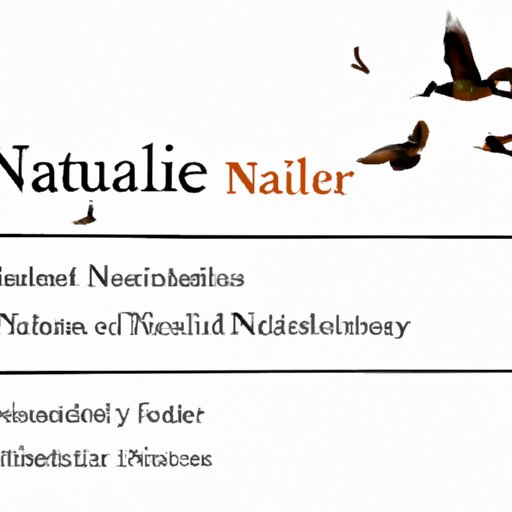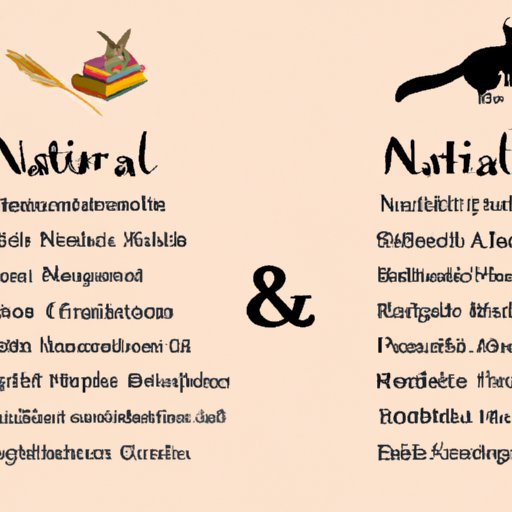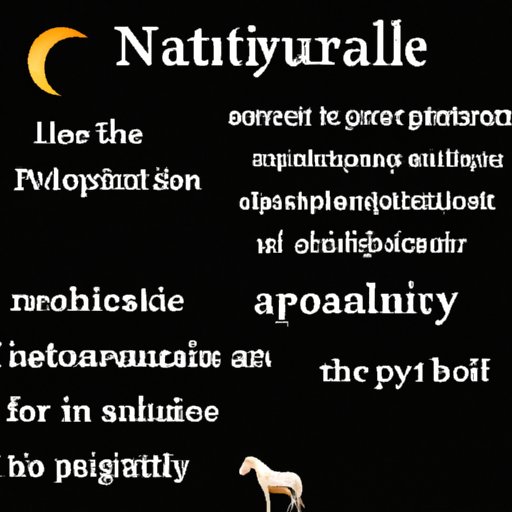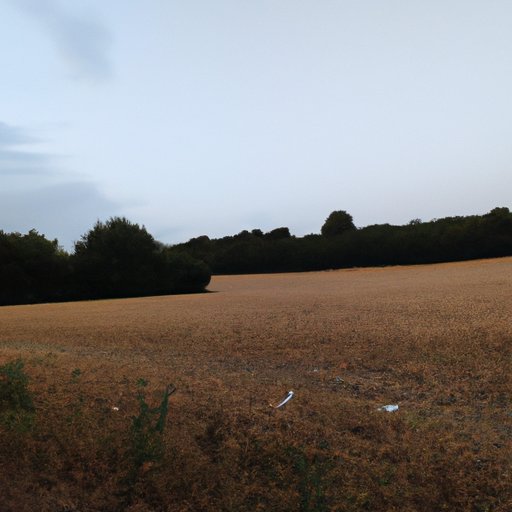Introduction
Naturalism is a genre of literature that emerged in the late 19th and early 20th centuries. It is characterized by its focus on objective reality, scientific principles, and the power of nature over human beings. Naturalism is often seen as a continuation of Realism, but there are some distinct differences between the two. This article will explore the different elements of naturalism in literature, including its historical context, evolution, and impact on classic works of literature. It will also examine the relationship between naturalism and realism, and compare and contrast naturalism with other literary genres. Finally, it will investigate the role of nature in naturalistic works.
Analyzing the Different Elements of Naturalism in Literature
In order to understand the concept of naturalism in literature, it is important to analyze the different elements that make up this genre. Naturalism is characterized by its focus on objective reality, scientific principles, and the power of nature over human beings. The characters in naturalistic works often lack free will and are subject to powerful forces beyond their control, such as poverty, illness, or other environmental factors. Naturalism also emphasizes the idea of determinism, which suggests that human behavior is determined by biological or environmental factors rather than individual choice.
The themes and motifs of naturalism typically revolve around suffering, struggle, and the inability of humans to control their destiny. Characters in naturalistic works often experience hardship and adversity due to external forces, and they are rarely able to triumph over these obstacles. Naturalism also often focuses on themes of alienation, dehumanization, and despair, as well as the difficulty of finding meaning in life.
Exploring the Origins and Development of Naturalism in Literature
Naturalism has its roots in the philosophical movement of positivism, which was popular in the late 19th century. Positivists believed that knowledge could only be acquired through observation and experimentation, and this belief was reflected in the writing of naturalist authors. Naturalism was further developed by French author Émile Zola, who wrote about the harsh realities of life and the power of nature over human beings. Zola’s work inspired a generation of writers, including American authors Stephen Crane and Jack London, who embraced the philosophical principles of naturalism and applied them to their own works.
The evolution of naturalism was further shaped by the rise of Darwinian evolutionary theory and the industrial revolution. These events had a profound effect on the way people viewed the world, and naturalism became a way for authors to reflect the changing environment and social conditions of the time. Naturalism continued to develop throughout the 20th century, and its influence can still be seen in contemporary literature.

Examining the Impact of Naturalism in Classic Works of Literature
Naturalism has had a significant impact on classic works of literature. Some of the most famous examples of naturalistic writing include Stephen Crane’s “The Red Badge of Courage,” Jack London’s “The Call of the Wild,” and Émile Zola’s “Germinal.” All three of these works explore themes of struggle, suffering, and the power of nature over human destiny. They also feature characters who are unable to escape their circumstances and are subjected to forces beyond their control.
In “The Red Badge of Courage,” Stephen Crane examines the psychological effects of war on a young soldier. The protagonist, Henry Fleming, is forced to confront his fear of death and come to terms with his mortality. He discovers that courage does not always come from within, but rather that it is something that must be earned through hardship and struggle. In “The Call of the Wild,” Jack London explores the theme of survival in the harsh wilderness. The protagonist, Buck, is taken from his comfortable home and thrown into the wild, where he must learn to survive against all odds. Finally, in “Germinal,” Émile Zola examines the plight of coal miners in 19th century France. The novel is filled with themes of suffering and despair as the miners struggle to survive in oppressive working conditions.

Investigating the Relationship Between Naturalism and Realism in Literature
Naturalism is often seen as an extension of Realism, but there are some distinct differences between the two. Realism is focused on representing everyday life in a truthful and accurate manner, while naturalism takes this one step further by exploring the power of nature and the effects of external forces on human behavior. Naturalism is also more pessimistic than Realism, as it often depicts characters who are unable to escape their circumstances and are subjected to powerful forces beyond their control.
Despite the differences between the two genres, Naturalism and Realism share many similarities. Both genres emphasize the importance of objectivity and accuracy, and both focus on depicting everyday life in a realistic manner. Additionally, both genres feature characters who are struggling to cope with difficult situations and are often unable to change their circumstances.

Comparing and Contrasting Naturalism and Other Literary Genres
Naturalism can also be compared and contrasted with other literary genres. One of the most notable comparisons is to Romanticism, which is often seen as the opposite of Naturalism. Romanticism is focused on idealism, emotion, and imagination, while Naturalism is focused on realism, scientific principles, and the power of nature. While both genres have their merits, Naturalism is often seen as a more accurate representation of reality.
Another comparison can be made between Naturalism and Modernism. Modernism is an experimental literary movement that emerged in the early 20th century and is characterized by self-reflexivity, fragmentation, and a rejection of traditional forms. Naturalism, on the other hand, is focused on realism and the power of nature, and it is often seen as a precursor to Modernism.

Understanding the Philosophy of Naturalism and Its Influence on Literature
The philosophical background of Naturalism is closely linked to the ideas of determinism and positivism. Determinism suggests that human behavior is determined by biological or environmental factors rather than individual choice, while positivism holds that knowledge can only be acquired through observation and experimentation. These beliefs were adopted by naturalist authors, who used them as the basis for their works. Naturalist authors sought to depict the harsh realities of life and the power of nature over human beings.
The impact of naturalistic thinking can be seen in classic works of literature. Many naturalist authors sought to expose the injustices of society and to show how individuals are affected by external forces. These works often featured characters who lacked free will and were unable to escape their circumstances. Naturalism also influenced later literary movements, such as Realism and Modernism, which adopted some of its philosophical principles.
Examining the Role of Nature in Naturalistic Literature
Nature plays a key role in naturalistic literature. Naturalists sought to depict the power of nature and its ability to shape human behavior. Nature is often seen as a force that is beyond human control and is capable of inflicting suffering and destruction. In naturalistic works, nature is often used as a symbol of chaos and destruction, and characters are often powerless against its power.
Nature can also be used to reflect the inner state of characters in naturalistic works. For example, in Jack London’s “The Call of the Wild,” the protagonist, Buck, is taken from his comfortable home and thrown into the wild, where he must learn to survive against all odds. The harshness of the wilderness reflects the inner struggles of Buck, and ultimately leads him to discover his true strength and courage.
Conclusion
In conclusion, naturalism is a genre of literature that emerged in the late 19th and early 20th centuries. It is characterized by its focus on objective reality, scientific principles, and the power of nature over human beings. Naturalism has had a significant impact on classic works of literature, and its influence can still be seen in contemporary works. Naturalism is often seen as a continuation of Realism, but there are some distinct differences between the two. Naturalism can also be compared and contrasted with other literary genres, such as Romanticism and Modernism. Finally, nature plays an important role in naturalistic works, as it is often used to reflect the inner state of characters and to symbolize chaos and destruction.
Naturalism remains relevant today, as its focus on realism and truth is just as applicable now as it was when the genre first emerged. Naturalism has had a lasting impact on literature, and its influence can still be felt in the works of contemporary authors. As long as the world continues to change, naturalism will remain an important part of the literary landscape.
(Note: Is this article not meeting your expectations? Do you have knowledge or insights to share? Unlock new opportunities and expand your reach by joining our authors team. Click Registration to join us and share your expertise with our readers.)
